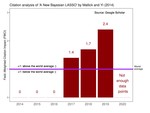Himel Mallick, PhD, FASA
Principal Investigator
Cornell University
Biography
Himel is a Principal Investigator and Tenure-track Faculty at Cornell University’s Department of Population Health Sciences and an Adjunct Faculty of Statistics and Data Science at Bowers College of Computing and Information Science.
His group at Cornell develops computational methods, software, and data products to generate and validate testable hypotheses that accelerate data-driven discovery. Much of his research has focused on reverse translational efforts aiming to integrate vastly different kinds of biological data by leveraging a combination of machine learning, systems biology, and omics data science techniques to enable target identification and biomarker discovery across a range of indications.
A recipient of the IISA ECASDS award, Himel is a Fellow of the American Statistical Association (FASA) and an elected member of the International Statistical Institute (ISI).
Curriculum Vitae: CV, Resume | Researcher Profile: ResearchGate, WOS
Interests
- AI/ML/Statistics
- Bayesian Biostatistics
- Computational Metagenomics
- Statistical Bioinformatics
- Omics Data Science
Education
-
Postdoctoral Fellowship in Computational Biology and Bioinformatics, 2019
Harvard University and Broad Institute
-
PhD in Biostatistics, 2015
University of Alabama at Birmingham
-
MSc in Statistics, 2009
Indian Institute of Technology Kanpur
-
BSc in Statistics, 2007
University of Calcutta




